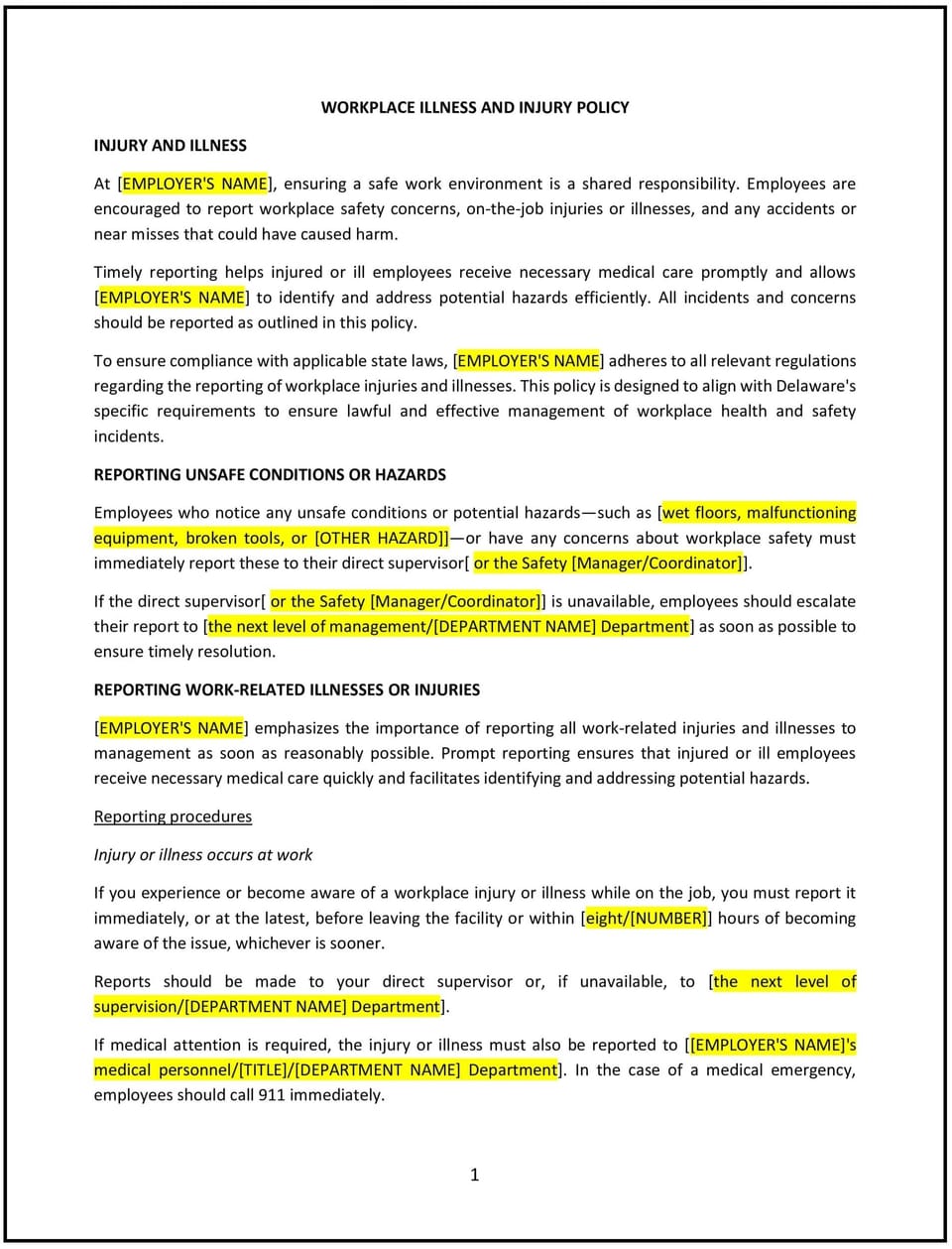Workplace illness and injury policy (Delaware): Free template

Workplace illness and injury policy (Delaware)
A workplace illness and injury policy helps Delaware businesses establish guidelines for preventing, reporting, and managing workplace illnesses and injuries. This policy outlines safety protocols, reporting procedures, and compliance with Delaware and federal regulations to ensure employee well-being and operational continuity.
By implementing this policy, businesses can promote a safer work environment, minimize risks, and comply with applicable workplace safety laws.
How to use this workplace illness and injury policy (Delaware)
- Define workplace illnesses and injuries: Specify the types of illnesses and injuries covered, including those resulting from accidents, exposure to hazards, or workplace conditions.
- Outline prevention measures: Include safety protocols, training, and workplace inspections to reduce risks of illness or injury.
- Provide reporting procedures: Detail how employees should report illnesses or injuries, including required documentation and timelines for submission.
- Establish response protocols: Specify steps for addressing reported incidents, such as providing first aid, contacting emergency services, or initiating an investigation.
- Include return-to-work guidelines: Outline procedures for employees to safely return to work after recovering from an illness or injury.
- Monitor compliance: Regularly review workplace practices and policies to ensure alignment with Delaware labor laws and OSHA regulations.
Benefits of using this workplace illness and injury policy (Delaware)
This policy offers several benefits for Delaware businesses:
- Promotes employee safety: Reduces risks of workplace illnesses and injuries through preventive measures and clear response protocols.
- Ensures compliance: Aligns with Delaware and federal regulations, such as OSHA requirements, minimizing legal risks.
- Enhances employee trust: Demonstrates the company’s commitment to worker health and safety, improving morale and retention.
- Reduces downtime: Establishes clear procedures for handling incidents, minimizing disruptions to operations.
- Encourages accountability: Promotes a culture of safety by outlining responsibilities for employees and management.
Tips for using this workplace illness and injury policy (Delaware)
- Communicate the policy clearly: Ensure employees understand their responsibilities, reporting procedures, and safety protocols.
- Train employees and managers: Provide regular training on workplace safety practices, hazard identification, and incident reporting.
- Conduct safety audits: Schedule regular inspections to identify and mitigate potential risks or hazards.
- Encourage prompt reporting: Emphasize the importance of reporting incidents immediately to ensure timely responses and accurate documentation.
- Update regularly: Revise the policy as needed to reflect changes in Delaware laws, workplace conditions, or industry best practices.
Q: Why is a workplace illness and injury policy important for my business?
A: This policy helps ensure compliance with Delaware and federal workplace safety regulations, reduces the risk of incidents, and demonstrates a commitment to employee well-being and safety.
Q: What should employees do if they experience a workplace illness or injury?
A: Employees should report the incident immediately to their supervisor or HR, complete the required incident report, and provide any relevant documentation, such as medical records.
Q: How does this policy help prevent workplace illnesses and injuries?
A: The policy includes safety protocols, employee training, and regular workplace inspections to identify and address potential hazards proactively.
Q: What steps should businesses take after an illness or injury is reported?
A: Businesses should investigate the incident, provide appropriate medical assistance, document the findings, and implement corrective actions to prevent similar occurrences.
Q: How can businesses ensure compliance with this policy?
A: Businesses can conduct regular safety audits, provide ongoing training, and monitor adherence to the policy to ensure compliance with Delaware laws and workplace safety standards.
This article contains general legal information and does not contain legal advice. Cobrief is not a law firm or a substitute for an attorney or law firm. The law is complex and changes often. For legal advice, please ask a lawyer.


